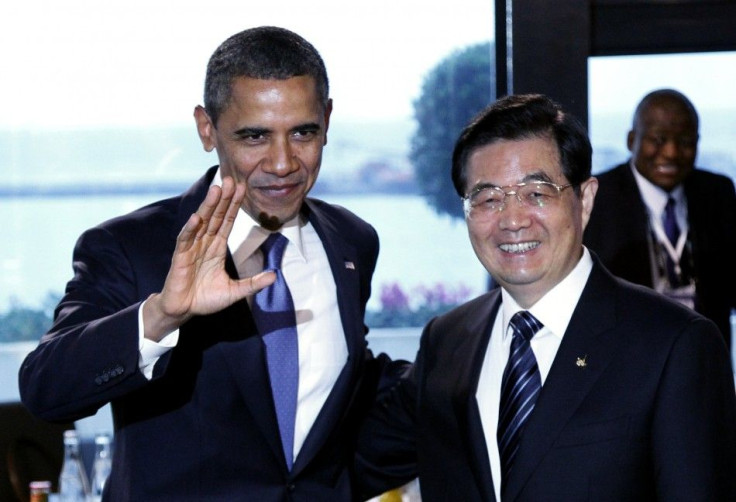U.S.-China, APEC Summit in Hawaii Preview: 5 Things to Know

President Barack Obama is headed to the Asia-Pacific Economic Cooperation (APEC) summit in Hawaii this weekend, where he will meet with Chinese President Hu Jintao and other leaders.
Here are five things to know about the summit:
Who will be there
The APEC is a forum comprised of 21 Pacific Rim countries that is focused on free trade and regional economic cooperation. Representatives from all of the member economies, as they are called, will be present and the meeting will be hosted by President Obama.
The group meets annually, and this year's summit is being held in Honolulu, Hawaii, at the Hawaii Convention Center on Saturday and Sunday.
The summit will focus on job growth through the enhancement regional cooperation and new regulations, according to a statement.
APEC will also talk about new green initiatives and environmentally sustainable economic growth.
“Our business community, particularly small and medium-size companies, should be quite pleased by the quality and number of concrete outcomes the United States and its APEC partner economies have achieved in 2011, particularly in our priority areas of strengthening regional economic integration, promoting green growth, and advancing regulatory convergence and cooperation,” stated Wendy Cutler, Assistant U.S. Trade Representative for Japan, Korea.
“Our hard work and cooperation on these issues should continue to yield benefits to all our stakeholders for many years.”
China is losing friends
China's relationship with member countries Vietnam and the Philippines suffered in 2011 after a row over the South China Sea. The territorial tensions were abated after a treaty signing in October, but goodwill is not fully restored. Additionally, China has had diplomatic spats with Japan and Taiwan recently.
With China's current economic dominance and traditional stubbornness, these issues will play a significant role in any regional policy decisions.
Additionally, lawmakers in the United States have been angered by China's currency policies, and tried to cite China for currency manipulation, and also wants bring new tariffs and penalties against China unless it increased the Yuan appreciation speed.
The Yuan
The Chinese government maintains a tight grip on the inflation and appreciation of the yuan, which has a direct effect on other countries' economies.
The pace of Chinese export growth translates directly into domestic political pressure. A stronger yuan makes Chinese exports more expensive in dollar and euro terms, and threatens jobs in the politically potent export sector, which already complains that China's relatively tight monetary policy has crimped growth, Bob Davis and Sudeep Reedy of the Wall Street Journal said on Thursday.
Obama will talk with President Hu about using a faster Yuan appreciation to steady European turbulence.
United States Pacific Command
What does a Hawaii-base military organization have to do with global commerce?
The Pacific Command was started in 1947 as a network of regional alliances built to counteract the Soviet presence in the Pacific. The military organization continues in its mission of deterring aggression, advancing regional security cooperation, responding to crises, and fighting to win to this day.
This peace and international cooperation has allowed economic development to thrive, especially among the 21 Asia-Pacific Economic Cooperation member states.
We've gotten rich as well and we've benefited greatly from economic development in Asia that may not have happened absent the U.S. military presence, Michael Mazza, a security expert at the American Enterprise Institute think tank, told Reuters.
We've seen over the past 30-plus years the region really blossom both economically and politically and people tend to forget or not even realize a reason for that is that the United States has ensured stability in Asia and the Asia-Pacific, Mazza added.
Military power still an issue
China has been spending quite a lot of cash on its military, the most of any country in the world after the United States. Last year, China spent $114 billion, which is almost twice what next-in-line France spent (although significantly less than the $700 billion spent by the U.S., which was engaged in two overseas wars). Each consecutive year, that figure gets higher.
China's rise in military prominence will surely be a topic of discussion, as it has been for the Obama administration in the past.
China, unlike its Asian peers, does not appear content with the American-made and -dominated international order, said a report from the Project 2049 Institute.
Beijing is neither a candidate for the kind of benign hegemonic rule that others would find legitimate, nor much interested in aiding Washington in shouldering global responsibilities.
Right now, this is a benign security threat to the United States and other Pacific powers. But if unchecked, it could raise serious concerns.
© Copyright IBTimes 2024. All rights reserved.





















